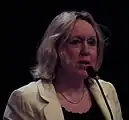2014 Liberal Democrats deputy leadership election
The 2014 Liberal Democrats deputy leadership election began on 18 December 2013, when the incumbent Deputy Leader of the Liberal Democrats, Simon Hughes, was appointed Minister of State at the Ministry of Justice, and opted to resign his party position to focus on his new post.[1]
| |||||||||||||||||
| |||||||||||||||||
| |||||||||||||||||
The post was elected by and from the party's 55 Members of Parliament in the House of Commons, who voted on 28 January 2014. (57 Liberal Democrat MPs had been elected at the previous general election, but at the time of the vote, both David Ward and Mike Hancock had had the whip withdrawn.) Lorely Burt was seen as the front-runner,[2] yet veteran MP Sir Malcolm Bruce, who had already announced that he would be standing down at the May 2015 general election, was elected as Deputy Leader on the second round of voting.[3]
Candidates
- Gordon Birtwistle, MP for Burnley since 2010.
- Sir Malcolm Bruce, MP for Gordon since 1983, who had already announced that he would be standing down from the House of Commons at the May 2015 general election, which ensured that in the event of his election, another election would be prompted by his retirement sixteen months later.
- Lorely Burt, MP for Solihull since 2005, and Parliamentary Private Secretary to Danny Alexander, was widely seen as the front-runner candidate.
Run-up to the election
The election coincided with the conclusion of Alistair Webster QC's report on the allegations of sexual harassment surrounding the party's former Chief Executive Lord Rennard, and in the weeks leading up to it, the party received extensive coverage surrounding sexual harassment claims against senior party figures including Lord Rennard, MP Mike Hancock,[4][5] and AM William Powell.[6]
Accordingly, numerous media commentators noted that it appeared highly likely the party would seek to offset criticism of its treatment of women by electing the frontrunner Burt as the party's first woman Deputy Leader, and after receiving 24 nominations, she was described as "the firm favourite".[7][8][9] Consequently, some expressed surprise at Burt's defeat by Bruce, with the Daily Express branding the result "a blunder of Olympian proportions" which left the party open to accusations of being "pale, male and stale".[10]
Result
| First round | ||||
|---|---|---|---|---|
| Candidate | Votes | % | ||
| Sir Malcolm Bruce | 26 | 48.1 | ||
| Lorely Burt | 25 | 46.3 | ||
| Gordon Birtwistle | 3 | 5.6 | ||
| Not voting | 1 | — | ||
| Turnout | 54 | 98.2 | ||
| Second ballot required | ||||
Gordon Birtwistle was eliminated after the first round, and his second preferences were redistributed.
| Second round | ||||
|---|---|---|---|---|
| Candidate | Change | Votes | % | |
| Sir Malcolm Bruce | +2 | 28 | 52.8 | |
| Lorely Burt | +0 | 25 | 47.2 | |
| Not voting | +1 | 2 | — | |
| Turnout | 53 | 96.4 | ||
| Sir Malcolm Bruce elected | ||||
See also
References
- "++ Lib Dem deputy leader Simon Hughes replaces Lord McNally as Justice Minister".
- "+++ Lorely Burt to stand for Liberal Democrat Deputy Leader".
- "Bruce elected Lib Dem deputy leader". 17 March 2018 – via BBC.
- Swinford, Steven (17 March 2018). "New Lib Dem scandal as Mike Hancock MP is suspended" – via The Telegraph.
- "Lib Dems suspend MP Mike Hancock over fresh allegations of sexual". 22 January 2014. Archived from the original on 1 May 2022.
- "AM warned on inappropriate behaviour". 17 March 2018 – via BBC.
- Walker, Jonathan (7 January 2014). "Solihull MP Lorely Burt likely to be next Liberal Democrat Deputy Leader".
- "The Lib Dems should elect a female deputy leader to address their woman problem". www.newstatesman.com.
- "The runners and riders for deputy leader of the Lib Dems - Coffee House". 20 December 2013.
- Giannangeli, Marco (2 February 2014). "Lorely Burt was the right woman for Lib Dem deputy leadership".


